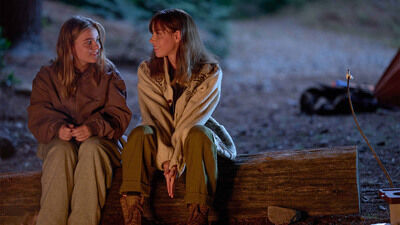Rona knows she’s in this situation because of her own behavior. She’s an alcoholic. Through multiple flashbacks, we learn of the mistakes that Rona made at school in London, ones that led to the break-up of her relationship with a charmer named Daynin (Paapa Essiedu). A night of extreme violence after too much drinking pushed Rona into rehab, but it’s hard to stay sober in the middle of nowhere when there’s nothing else to do.
Saoirse Ronan gives another deeply felt performance, capturing so much of Rona’s emotional journey that it’s disappointing how much the script feels the need to play games with this acting turn. There’s no reason not to tell this story in a linear fashion other than to keep some of Rona’s more upsetting behavior for the final act. The film is so constantly jumping around in time that it loses the emotional power it could have had just sketching the development, rehabilitation, and daily battles of alcoholism. Ronan’s performance will keep people engaged, especially those who have fought this disease themselves, because of how truthful it feels, but the film around it feels like it doesn’t trust its leading lady or the audience enough to truly showcase it.

Finally, there’s the odd duck that is “Little Death,” a film from the NEXT program that proves that if you try to make two films at once, you’re really just making two half-films. Without major spoilers, music video director Jack Begert has made a film that starts as one story before making a hard-left turn into an entirely different film in tone, character, and style. Both films are thematically connected by addiction, and the point could be that our current pharmaceutical crisis impacts people of all classes, but I couldn’t shake the feeling that the two halves didn’t really work together to form a whole as much as leave me wanting more.
At first, “Little Death” is the hyperactive, self-aware, overly precious story of a screenwriter (David Schwimmer) who is struggling with just about everything. He’s kind of started to hate his fiancée (Jena Malone), almost hoping that the mole on her neck is cancerous, and he’s fascinated by the dreams he keeps having of a mysterious woman (Angela Sarafayan). He’s working on a screenplay about a writer, of course, and “Little Death” becomes meta in the sense that it sometimes feels like what we’re watching is the screenwriter within the film’s final product. When the studio agrees to finance it if he changes the gender of his largely autobiographical story, “Little Death” really digs into yet another commentary on how hard it is to be a white middle-aged dude in Hollywood. Yes, it centers how we don’t need another one of those, but it’s still largely one of those.

